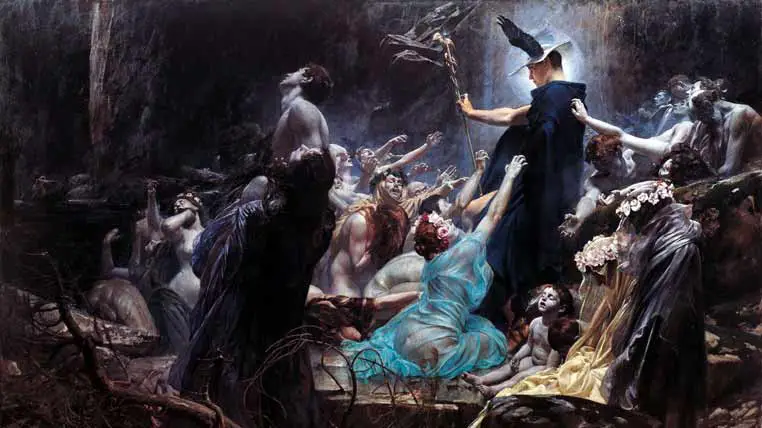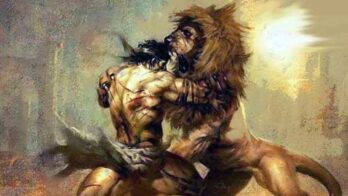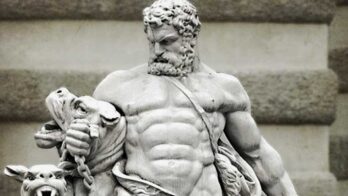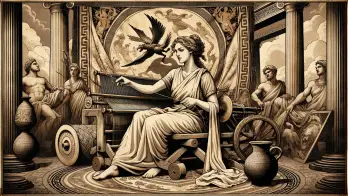Homer and Hesiod portrayed the messenger of the gods as both crafty and deceitful, as well as a benefactor of mortals.
In Greek mythology, Hermes (known as Mercury in Roman mythology) was the god of commerce, travel, thievery, diplomacy, sports, astronomy, astrology, and writing.
Hermes protected travelers and bestowed blessings upon those who offered hospitality.
He was also venerated as a god of fertility and protector of herds of animals, which were essential to the welfare of ancient Greeks. Additionally, the god had the task of guiding the souls of the dead to the Underworld.
The god is depicted either as a strikingly handsome and athletic young man or as an old man with a beard. Regardless of his physical appearance, the god is easily recognizable by his winged sandals and messenger’s staff, the caduceus.
The caduceus, generally carried by couriers such as Iris, the messenger of Hera, is a medium-length rod surrounded by two snakes.
In mythological graphical representations, the staff has two eagle wings at one of the ends, while the snakes have the appearance of serpents.
Etymology
The earliest form of the name “Hermes” is derived from the Greek term hermāhās, but the origin of the god’s name remains uncertain. Some scholars have linked it to the Greek word ἕρμα (herma), but this term is most likely not part of the Proto-Indo-European vocabulary.
Professor Robert Stephen Paul Beekes rejected the connection with the herma term and suggested an origin from a form of language that preceded Ancient Greek.
This theory implies that Hermes is likely a pre-Hellenic god, and the beginnings of his cult are shrouded in mystery.
Arthur Lincoln Frothingham, Jr., a renowned archaeologist and professor at Princeton University, believed that the god had been “borrowed” from Mesopotamian mythology.
In Mesopotamian mythology, the snake god Ningishzida is described as the messenger of the gods and a mediator between man and divinity.
Based on the etymology of the god’s name, Socrates was the first to provide a more detailed description of his fundamental traits.
Hermes refers to discourse, for he is an interpreter, a herald, a thief, a cheat in words, and a clever merchant, all related to the virtue of the word.
Socrates explains that speaking means using the word, and that emésato, often used by Homer, means to investigate in all sorts of ways.
From these two elements, speaking and investigating the word, Hermes is considered the lawgiver of this god: ‘You, people, to the one who did speaking investigation (tò eírein emésato), you would rightly call him Eirémes.’
However, people made his name more beautiful and called him Hermes.
Myths and Legends
Hermes is one of the most intriguing and multi-faceted figures in Greek mythology.
He is the messenger of the gods, the god of commerce, thieves, travelers, and the patron of shepherds and athletes. Hermes was born on Mount Cyllene in Arcadia, Greece, and had a fascinating origin story.
According to Greek mythology, the god was born in a cave on Mount Cyllene. He immediately displayed his cunning nature by escaping from his swaddling clothes and running away to Thessaly.
There, he stole cattle that belonged to his half-brother, Apollo. Only one person, a shepherd named Battus, saw the theft, but Hermes convinced him to keep quiet.
Back in the cave, Hermes found a tortoise and used its shell and pig intestines to create a musical instrument called a lyre.
When Apollo discovered the theft, Hermes charmed him with the sweet music of the lyre and traded it for the stolen cattle. Pleased with his son’s intelligence, Zeus made Hermes the messenger of the gods.
Hermes played a crucial role in many Greek legends. In the events leading up to the Trojan War, he accompanied Athena, Hera, and Aphrodite to Mount Ida, where Paris chose Aphrodite as the most beautiful goddess, and was promised the most beautiful woman on earth, Helen, as his wife.
The god also guided King Priam to the Greek camp in the Iliad and helped Odysseus overcome Circe’s spells in the Odyssey.
Hermes intervened in the story of Perseus, whom he and Athena helped to kill Medusa. He offered Perseus a sword and lent him his winged sandals, while Athena gave him a golden shield.
In another myth, he helped Zeus’ mortal beloved, Io, escape the thousand-eyed Titan, Argus, by playing the flute until Argus fell asleep, and then cutting off his head.
Hermes also mediated the bargain between Heracles and Omphale and accompanied the young Dionysus through the world, as per Zeus’ command, while being pursued by the wrath of Hera.
In the myth of the abduction of Persephone, Zeus sent Hermes to liberate Demeter’s daughter from the Underworld, and he guided her back to Earth to reunite with her mother.
Hermes Genealogy
In Greek mythology, Hermes is the son of Zeus and the nymph Maia. Like most Olympians, he had multiple lovers and fathered many children with them.
Parents
- Zeus, the king of the gods and the god of the sky, thunder, and lightning;
- Maia, a nymph and the daughter of Atlas, the Titan who held up the sky.
Siblings:
- Apollo, the god of music, poetry, prophecy, and healing;
- Artemis, the goddess of the hunt, wilderness, childbirth, and virginity;
- Athena, the goddess of wisdom, war, and crafts;
- Ares, the god of war and violence;
- Aphrodite, the goddess of love, beauty, and sexuality;
- Dionysus, the god of wine, parties, and festivals;
- Hebe, the goddess of youth and cupbearer to the gods;
- Hercules, the demigod hero known for his strength and bravery;
- Helen of Troy, the legendary beauty whose abduction sparked the Trojan War;
- Persephone, the goddess of the underworld and queen of the dead;
- Perseus, the demigod hero known for his slaying of Medusa and other feats;
- The Muses, the nine goddesses of inspiration in literature, science, and the arts;
- In some versions of the myth, Hermes also had a half-brother named Pan, the god of wild nature, shepherds, and flocks, who was said to be the son of Hermes and a nymph named Dryope.
Consorts:
- Aphrodite, the goddess of love, beauty, and sexuality;
- Aglaia, one of the three Graces, who was the goddess of beauty, charm, and grace;
- Peitho, the goddess of persuasion and seduction;
- Tyche, the goddess of fortune, luck, and prosperity;
- Chione, a nymph who was the daughter of the North Wind, Boreas;
- Herse, a daughter of Cecrops, the legendary founder of Athens;
- Sose, a daughter of Selene, the goddess of the moon;
- Penelopeia, a shepherdess who bore him a son named Pan;
- Battus, a queen who bore him a son named Polyphemus;
- Erytheia, a daughter of Geryon, the giant who had three bodies and was slain by Heracles;
- Hecate, the goddess of witchcraft, magic, and crossroads.
Children:
- Pan, the god of wild nature, shepherds, and flocks. His mother was the nymph Dryope;
- Hermaphroditus, a god who was both male and female and was associated with fertility and marriage. His mother was the goddess Aphrodite;
- Abderus, a mortal who was a friend of the hero Heracles. He was killed by the Mares of Diomedes;
- Autolycus, a skilled thief and trickster who was the grandfather of the hero Odysseus. His mother was the nymph Chione;
- Eudoros, a warrior who fought in the Trojan War on the side of the Greeks. His mother was unknown;
- Eleusis, a legendary king who was said to have founded the city of Eleusis in Greece. His mother was unknown;
- Polydeuces, a son of Hermes who was known for his beauty. His mother was unknown;
- Hermes was also believed to be the father of various figures in Greek mythology, including the inventor Daedalus and the hero Perseus (although some versions of the myth say that Perseus was the son of Zeus).
Mercury in Roman Mythology
In the early 4th century BC, the Romans incorporated Hermes into their own religion, combining some of the attributes of the Greek god with those of the Etruscan god Turms, resulting in the god Mercury.
According to Saint Augustine, the Latin name “Mercury” could have derived from “medio currens,” a reference to Hermes’ role as mediator and messenger in Greek mythology.
Mercury became one of the most well-known Roman gods, evidenced by the many temples and altars raised to honor the god.
Historians note that, in addition to attributes, the Romans kept the Greek god’s appearance – either a young athletic man or an old man with a beard; characteristics that were also predominant in the case of the god Turms.
Just like in the representations found on Greek monuments, Mercury holds the famous magic staff in his hand and wears winged sandals.
The Romans identified the Norse god Odin with Mercury, and there is evidence that the Germanic tribes that came into contact with Roman culture also embraced this identification.
Odin and Mercury share some common qualities. For example, both hold a staff, wear a hat with wide brims, and often travel, exploring the world of mortals.
However, this connection between Mercury and Odin is more complex than these superficial similarities. Thus, both gods are closely linked to the motif of death.
Mercury is the one who travels between the world of the living and the underworld of the dead. On the other hand, Odin is the god of death from Valhalla. Both gods are perfect orators, brilliant, and keepers of secret teachings.
Another syncretism from the Imperial Roman period is offered in the form of Hermanubis, the result of the identification of Mercury with the Egyptian god of death, Anubis.
Mercury and Anubis were psychopomps (guides of souls), one of the main reasons for their “merging” into a single god.
In Roman belief, Hermanubis was portrayed with a human body and a jackal’s head, holding a caduceus.
In addition to leading and guiding the souls of the dead, Hermanubis was also seen as a representation of the Egyptian priests in their perpetual attempt to decipher the mysteries of life and death.
At the beginning of the 1st century AD, how Mercury was represented in Roman religion underwent a radical change. The Romans saw in the ancient god a mere mortal raised to deity status through the prism of legends and fabulous stories.
This radical change is attributed to a compilation of works encompassing books of astrology, alchemy, theology, and magic.
The god was identified as Hermes Trismegistus, an original hero from Alexandria. The works are now known as the Hermetica.
Symbolism and Significance
Hermes symbolizes cunning and resourceful intelligence as he patronizes commerce.
His attribute, the winged sandals, signifies the power of devotion and the ability to move quickly.
However, this force is somewhat limited to a utilitarian level and is easily lost. He also represents a perverted mind; he is the protector of thieves, a form of intellectual perversion that works in all kinds of trickery, shrewdness, and fraud.
According to the biological myth, the god was born in a cave in Arcadia.
After his birth, he escaped from his swaddling clothes into Thessaly and stole his brother Apollo’s cattle. After hiding the stolen cattle, seen only by the Shepherd Battos, he returned to his natal cave.
Hermes is the one who discovered the lyre, stretching strings made of the intestines of the oxen he had sacrificed on the shell of a turtle.
It was the first lyre offered to Apollo, who heard its chords coming from the cave’s depths where Hermes had retreated and where Apollo had entered angrily to recover his cattle.
Then, Hermes invented the flute, which he gave to Apollo in exchange for a lesson in divinatory magic, and a golden caduceus, which became the inseparable symbol of Hermes, completed with two other symbols: the hat with wide brims and the golden-winged sandals.
Impressed by his craftsmanship, Zeus chose Hermes as his herald to the gods of the Underworld, Persephone and Hades.
He is often represented carrying a ram on his back, hence his name Kriophoros.
Hermes is also the protector of shepherds and the guide of souls in the abode of the dead. From this function comes his name Hermes Psychopompus, the Accompanier of Souls.
He symbolizes the Good Shepherd.
He was honored as the god of travel at crossroads, where statues were erected to ward off ghosts and protect travelers from ill-fated meetings.
Even roads were paved with stones consecrated to him. Herald par excellence, the bringer of good news, Hermes symbolizes the exchanges between Heaven and Earth. He ensures the journey, the transition between the infernal, earthly, and heavenly worlds.
His symbolism is also inspired by the Egyptian god Thoth, the vicar of the supreme god Ra.
Thoth is an enlightener, herald, judge, guide, and mediator, and he embodies wisdom and the path to eternity revealed to people.
Consequently, he is the tetramorph god of the four winds of the sky and of the four faces.
These attributes have a double meaning; they embody the totality of knowledge coming from the world’s four corners and from all levels of existence.
Subjectively, Hermes also represents the countless ways of receiving his message, the myriad faces and interpretations that his word takes in people’s minds, with everyone being sure they understand it correctly.
At Ancient Theory we only use trusted sources to document our articles. Such relevant sources include authentic documents, newspaper and magazine articles, established authors, or reputable websites.
- Hermes, the messager of the goods - greekmythology.com.
- Hermes - wikipedia.org. [Source]
- Hermes - britannica.com. [Source]
- Mark Cartwright - Hermes. worldhistory.org.
- Walter Burkert - Greek Religion. Harvard University Press, 1985.
- R.S.P. Beekes - Etymological Dictionary of Greek.
- Greek History and the Gods - Grand Valley State University (Michigan). Princeton University Press.
- Ruth Padel - In and Out of the Mind: Greek Images of the Tragic Self. Princeton University Press.






